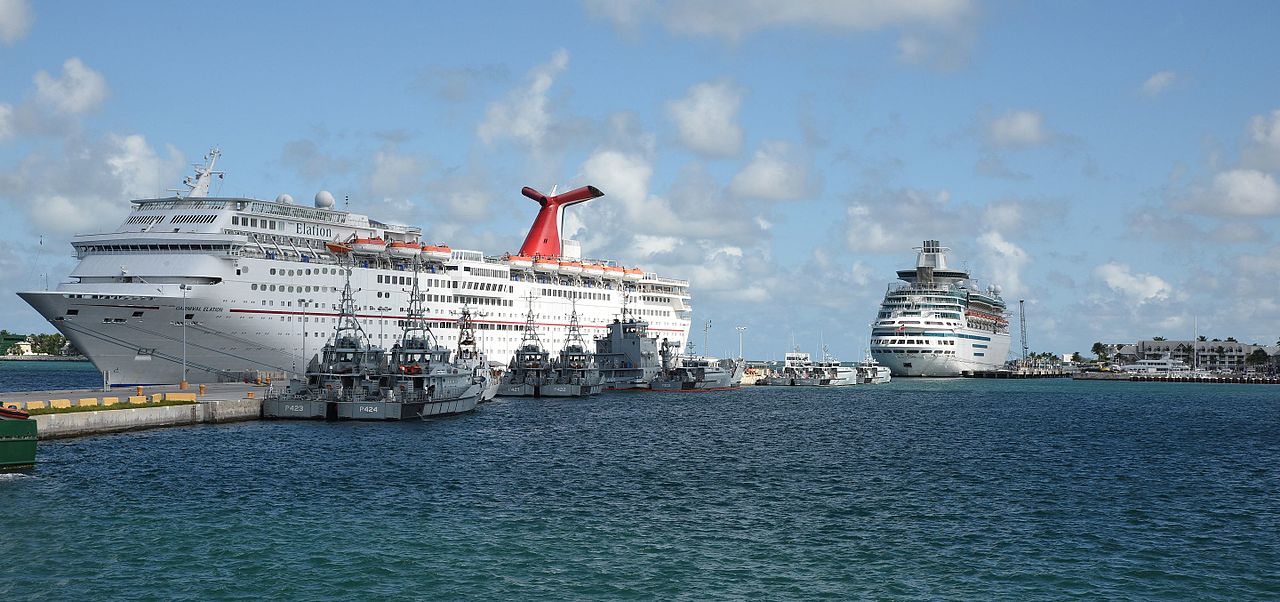Above Photo: KEY WEST, Florida (October 5, 2016) Nine ships from the Royal Bahamas Defence Force, research vessel Walton Smith and a contract vessel take shelter at Naval Air Station Key West’s Mole Pier Oct. 5 as Hurricane Matthew approaches Florida. NAS Key West is not currently projected to be in Matthew’s path and as such, stands by to support other services and relief efforts. NAS Key West is a state-of-the-art facility for air-to-air combat fighter aircraft of all military services and provides world-class pierside support to U.S. and foreign naval vessels. (U.S. Navy Photo by Petty Officer 2nd Class Cody R. Babin/Released)
As a travel specialist with over 40 cruises under my belt, one question comes up just about every fall, “Should I book a cruise during hurricane season?” With compliments to Jimmy Buffett, should any of us try to reason with hurricane season?
I know, rational thinking sounds like the correct approach, but if I am thinking about my family having to deal with a hurricane, emotional reactions and avoiding epic nature disasters are the order of the day! As with many things in life that are scary, the more you know about hurricanes, the more you can make informed travel decisions and keep anxiety levels at manageable levels.
When is Hurricane Season?
Since most people are thinking about storms that impact the United States, I will focus on Hurricanes that form in the Atlantic and impact the United States. The Atlantic season is roughly from June 1st to November 30th. Weather conditions change every year and hurricanes tend you have their own cycle that ebbs and flows. Yes, you can have storms early and late in the season but the distribution of storms is concentrated in the months of August, September, and October.
The National Hurricane Center has some great tools for educating yourself on hurricanes. They breakdown all kinds of storms including Tropical Depressions, Tropical Storms, Minor Hurricanes and Major Hurricanes. When you start talking about storms that actually hit the United States, a decade might have 14 total hurricanes but probably only 5 of those will be a major storm. The odds of a hurricane occurring on the week your cruise is scheduled is not likely. Of course, telling someone that the hurricane they are experiencing is not a major storm will probably not get a kind response. If it is impacting your vacation….it is a major storm!
Cruise Line Responses
Since Hurricanes are part of doing business in the Caribbean, you can imagine that the cruise lines are prepared to deal with storms when they occur. The cruise lines first priority is the safety of their passengers and crew. They also have large investments tied up in their ships, so safety is paramount to them. Many clients become frustrated with the cruise lines for not being able to answer their questions when a storm is forming. Honestly, the actions of individual storms are very hard to predict, so cruise lines wait until there is a strong consensus on a storm path prior to making decisions on a specific sailing.
The great thing about is a ship is that it can sail much faster than a hurricane and the Caribbean is a big Sea. A storm that is impacting the Bahamas will have no impact on Grand Cayman or Cozumel. The normal response of the cruise line is to change the itinerary to avoid a storm. If the effects are going to be longer-lasting, they might change the length of an itinerary or possibly even disembark at a port that is a safe distance from the storm.
Passenger Preparations
Most people don’t like to be put in situations they don’t control. Having a hurricane impacting your travel is one of those situations where you don’t have any control. The cruise lines and the airlines are trying to balance the needs of all their passengers and are often scrambling to do their best in an ever-changing situation. Fortunately, there are steps you can take to put yourself in the best possible position.
- Decide how much risk you can tolerate. If you are a person that has no interest in even thinking about dealing with a storm, pick itineraries that are outside the hurricane season. Sure, the rates might be higher but you can lower your risks by booking trips outside the season.
- Work with a travel professional. This is when experience can make a huge difference. Wouldn’t it be great to have one person that you can count on to help you navigate flight changes, or hotel needs or discussions with the cruise line? A travel professional can be making arrangements for you when you can’t make them for yourself. I think I provide a great service to all of my customers but when plans need to change quickly, that is where my service has a huge impact on the experiences of my customers.
- Purchase Travel Protection and know what your plan covers. This is a must. Most people only think Travel Protection is important if they have to cancel a trip for illness or a death in the family. Most good policies will also cover trip interruption or trip delays. Discuss these benefits with your travel professional. Many plans have a 24 hour,7-day per week help desk that can assist you if your travel plans go off the rails.
- Consider “Cancel For Any Reason” Travel Protection. Classic Travel Protection has very specific language about what the policy will and will not cover. As an example, if the cruise line changes their itinerary but is still planning on sailing, a typical travel protection plan would not cover your cancelation fees if you decided you didn’t want to go on that cruise. With Cancel For Any Reason Coverage, you can decide this is not a trip for you and you will have coverage. Work with your Travel Professional to understand the limits of your coverage. Sometimes you will get a future cruise credit or if you get cash back, it will only be a percentage of your cancellation fee.
Expect the Unexpected
I tell all my clients that the first thing they should pack for their trip is a good amount of patience. Life happens and every good plan tends to run into trouble now and then. As I mentioned, I have been on over 40 cruises and only once did I have a trip impacted by a hurricane. As it turned out, we missed a port call but it was pretty easy for our ship to avoid a rather erratic and unpredictable storm. Hurricanes do happen, but if you think about how many times they impact travel, your odds are pretty good. Work with a professional, know your own risk tolerance, purchase travel protection just in case and odd are, you will make a lifetime of memories.
Above Photo: KEY WEST, Florida (October 5, 2016) Nine ships from the Royal Bahamas Defence Force, research vessel Walton Smith and a contract vessel take shelter at Naval Air Station Key West’s Mole Pier Oct. 5 as Hurricane Matthew approaches Florida. NAS Key West is not currently projected to be in Matthew’s path and as such, stands by to support other services and relief efforts. NAS Key West is a state-of-the-art facility for air-to-air combat fighter aircraft of all military services and provides world-class pierside support to U.S. and foreign naval vessels. (U.S. Navy Photo by Petty Officer 2nd Class Cody R. Babin/Released)
As a travel specialist with over 40 cruises under my belt, one question comes up just about every fall, “Should I book a cruise during hurricane season?” With compliments to Jimmy Buffett, should any of us try to reason with hurricane season?
I know, rational thinking sounds like the correct approach, but if I am thinking about my family having to deal with a hurricane, emotional reactions and avoiding epic nature disasters are the order of the day! As with many things in life that are scary, the more you know about hurricanes, the more you can make informed travel decisions and keep anxiety levels at manageable levels.
When is Hurricane Season?
Since most people are thinking about storms that impact the United States, I will focus on Hurricanes that form in the Atlantic and impact the United States. The Atlantic season is roughly from June 1st to November 30th. Weather conditions change every year and hurricanes tend you have their own cycle that ebbs and flows. Yes, you can have storms early and late in the season but the distribution of storms is concentrated in the months of August, September, and October.
The National Hurricane Center has some great tools for educating yourself on hurricanes. They breakdown all kinds of storms including Tropical Depressions, Tropical Storms, Minor Hurricanes and Major Hurricanes. When you start talking about storms that actually hit the United States, a decade might have 14 total hurricanes but probably only 5 of those will be a major storm. The odds of a hurricane occurring on the week your cruise is scheduled is not likely. Of course, telling someone that the hurricane they are experiencing is not a major storm will probably not get a kind response. If it is impacting your vacation….it is a major storm!
Cruise Line Responses
Since Hurricanes are part of doing business in the Caribbean, you can imagine that the cruise lines are prepared to deal with storms when they occur. The cruise lines first priority is the safety of their passengers and crew. They also have large investments tied up in their ships, so safety is paramount to them. Many clients become frustrated with the cruise lines for not being able to answer their questions when a storm is forming. Honestly, the actions of individual storms are very hard to predict, so cruise lines wait until there is a strong consensus on a storm path prior to making decisions on a specific sailing.
The great thing about is a ship is that it can sail much faster than a hurricane and the Caribbean is a big Sea. A storm that is impacting the Bahamas will have no impact on Grand Cayman or Cozumel. The normal response of the cruise line is to change the itinerary to avoid a storm. If the effects are going to be longer-lasting, they might change the length of an itinerary or possibly even disembark at a port that is a safe distance from the storm.
Passenger Preparations
Most people don’t like to be put in situations they don’t control. Having a hurricane impacting your travel is one of those situations where you don’t have any control. The cruise lines and the airlines are trying to balance the needs of all their passengers and are often scrambling to do their best in an ever-changing situation. Fortunately, there are steps you can take to put yourself in the best possible position.
- Decide how much risk you can tolerate. If you are a person that has no interest in even thinking about dealing with a storm, pick itineraries that are outside the hurricane season. Sure, the rates might be higher but you can lower your risks by booking trips outside the season.
- Work with a travel professional. This is when experience can make a huge difference. Wouldn’t it be great to have one person that you can count on to help you navigate flight changes, or hotel needs or discussions with the cruise line? A travel professional can be making arrangements for you when you can’t make them for yourself. I think I provide a great service to all of my customers but when plans need to change quickly, that is where my service has a huge impact on the experiences of my customers.
- Purchase Travel Protection and know what your plan covers. This is a must. Most people only think Travel Protection is important if they have to cancel a trip for illness or a death in the family. Most good policies will also cover trip interruption or trip delays. Discuss these benefits with your travel professional. Many plans have a 24 hour,7-day per week help desk that can assist you if your travel plans go off the rails.
- Consider “Cancel For Any Reason” Travel Protection. Classic Travel Protection has very specific language about what the policy will and will not cover. As an example, if the cruise line changes their itinerary but is still planning on sailing, a typical travel protection plan would not cover your cancelation fees if you decided you didn’t want to go on that cruise. With Cancel For Any Reason Coverage, you can decide this is not a trip for you and you will have coverage. Work with your Travel Professional to understand the limits of your coverage. Sometimes you will get a future cruise credit or if you get cash back, it will only be a percentage of your cancellation fee.
Expect the Unexpected
I tell all my clients that the first thing they should pack for their trip is a good amount of patience. Life happens and every good plan tends to run into trouble now and then. As I mentioned, I have been on over 40 cruises and only once did I have a trip impacted by a hurricane. As it turned out, we missed a port call but it was pretty easy for our ship to avoid a rather erratic and unpredictable storm. Hurricanes do happen, but if you think about how many times they impact travel, your odds are pretty good. Work with a professional, know your own risk tolerance, purchase travel protection just in case and odd are, you will make a lifetime of memories.







